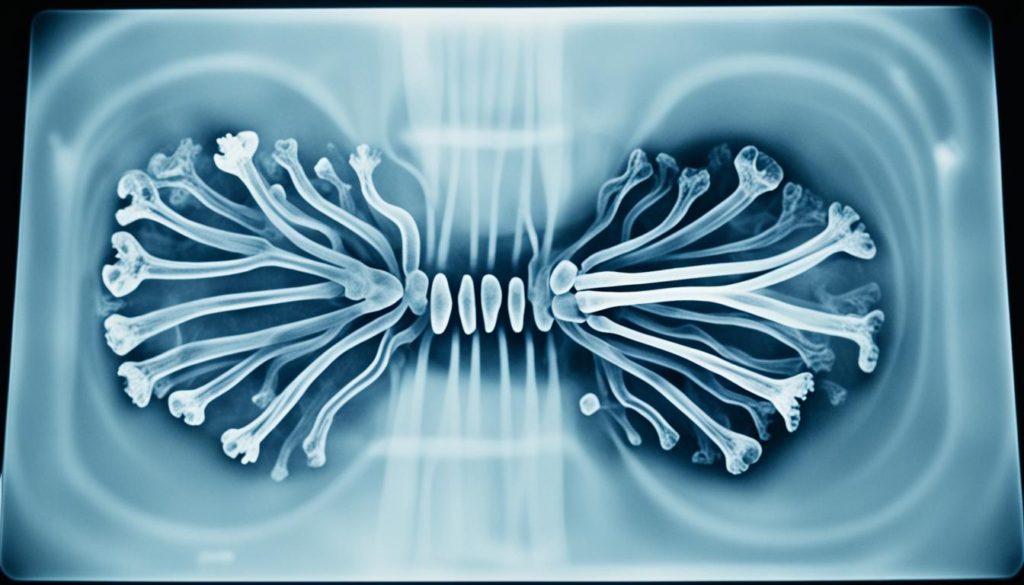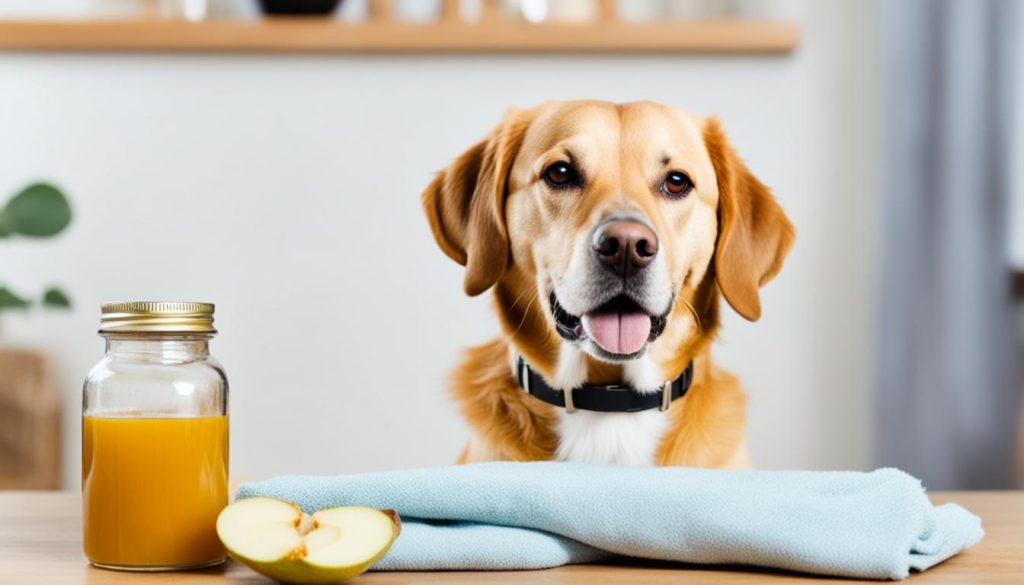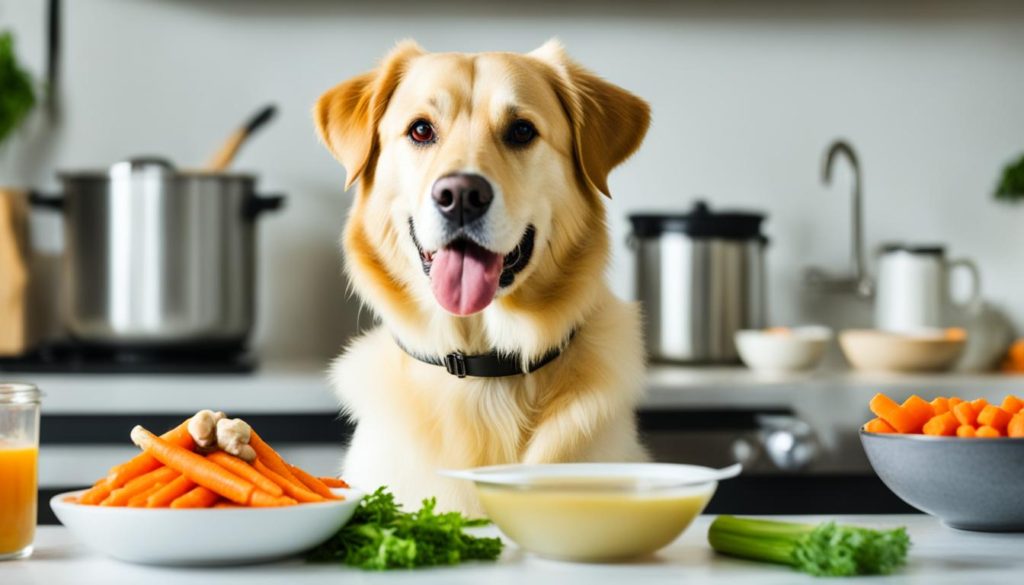Accidents happen, and sometimes our furry friends may accidentally ingest chicken bones. This can be concerning as chicken bones can pose risks to their health and safety. In this section, we will discuss some home remedies that can help if your dog has eaten chicken bones, providing you with quick response and care options for your beloved pet.
Key Takeaways:
- Accidental ingestion of chicken bones can be dangerous for dogs and requires immediate attention.
- Home remedies can assist in helping your dog safely pass the bones.
- Always consult your veterinarian when your dog has consumed chicken bones.
- Prevention is key to avoiding such incidents in the future.
- Maintain a healthy diet and feeding schedule for your dog to reduce the likelihood of them seeking out dangerous items.
The Dangers of Dogs Eating Chicken Bones
When it comes to dogs and chicken bones, the potential dangers cannot be understated. Chicken bones can pose significant risks to your furry friend’s health and well-being. Whether it’s a large drumstick or a small bone from a chicken wing, it’s crucial to understand the potential hazards and take immediate action if your dog has consumed chicken bones.
One of the primary concerns with chicken bones is their tendency to splinter. Unlike bones that are specifically designed for your dog to chew on, chicken bones can fracture into sharp shards that can cause serious harm. These splinters can lead to choking hazards, gastrointestinal obstructions, or internal injuries when ingested by dogs.
Choking hazards occur when a bone fragment becomes lodged in your dog’s throat, obstructing their airway. This situation can quickly escalate into a life-threatening emergency that requires immediate veterinary intervention.
Gastrointestinal obstructions are another danger associated with dogs eating chicken bones. The sharp fragments can become stuck in your dog’s digestive tract, causing blockages that prevent the passage of food, water, and other substances. This condition can lead to severe pain, vomiting, diarrhea, and even require surgical intervention to remove the blockage.
Moreover, chicken bone fragments can cause internal injuries as they traverse the digestive system. These injuries may range from minor tears or irritations to more severe conditions like perforations, which can lead to peritonitis, a potentially life-threatening infection.
Given these risks, prompt action is crucial if you suspect that your dog has ingested chicken bones. Contact your veterinarian immediately for professional guidance tailored to your dog’s specific situation, size, and breed. In some cases, they may recommend an examination and X-rays to assess the potential damage caused by the bone ingestion.
While waiting for veterinary advice, there are a few home remedies you can try that may help your dog pass the bones more safely. It’s important to note that these remedies are not guaranteed to work in all cases, and they should not replace professional veterinary care.
Home Remedies for Dogs Who Ingested Chicken Bones:
- Feeding Bread or Soft Foods: Giving your dog small pieces of bread or soft, bulky foods like mashed potatoes or canned pumpkin may help cushion the bones and aid their passage through the digestive tract.
- Hydrogen Peroxide Solution: In some situations, your veterinarian may recommend using a hydrogen peroxide solution to induce vomiting. This should only be done under the guidance of a professional, as it can have potential risks and should not be used in all cases.
- Monitoring Your Dog: Keep a close eye on your dog for any signs of discomfort, difficulty in passing stools, or other alarming symptoms. If your dog shows any signs of distress, seek immediate veterinary care.
Remember, prevention is always better than cure. Make sure to keep chicken bones and other hazardous items out of your dog’s reach, and provide them with safe and appropriate chew toys to satisfy their natural urge to chew. By taking these precautions, you can protect your beloved pet from the dangers associated with ingesting chicken bones.
| Dangers of Dogs Eating Chicken Bones | Home Remedies to Address them |
|---|---|
| Choking hazards | Feeding bread or soft foods |
| Gastrointestinal obstructions | Hydrogen peroxide solution (under professional guidance) |
| Internal injuries | Monitoring your dog for symptoms and seeking veterinary care |
Signs Your Dog May Have Eaten Chicken Bones
Identifying the signs that your dog may have ingested chicken bones is crucial for early intervention. Here are some common symptoms to watch out for:
- Difficulty in swallowing: If your dog is experiencing trouble swallowing or seems to be choking, it could be an indication that they have swallowed chicken bones.
- Excessive drooling: Excessive drooling can be a sign of discomfort or pain in your dog’s mouth or throat, potentially caused by the presence of chicken bones.
- Refusal to eat or drink: If your dog suddenly loses their appetite or refuses to drink water, it could be a response to the discomfort caused by chicken bone ingestion.
- Vomiting: Persistent vomiting, especially if you notice bone fragments in the vomit, may suggest that your dog has ingested chicken bones.
- Abdominal pain: Dogs who have eaten chicken bones may experience abdominal pain, which can manifest as restlessness, whining, or a hunched posture.
If you observe any of these symptoms in your dog, it is important to take immediate action and provide appropriate remedies to ensure their well-being.

The image above provides a visual representation of the signs to look out for if you suspect your dog may have swallowed chicken bones.
What to Do If Your Dog Ate Chicken Bones
If you suspect that your dog has ingested chicken bones, it’s essential to take immediate action to ensure their safety. Assess the situation and contact your veterinarian right away. Professional guidance is crucial, as they can provide advice tailored to your dog’s specific situation, size, and breed. While waiting for veterinary assistance, you can take certain holistic methods and effective home remedies to help your dog pass the bones safely.
Here are some recommended home remedies:
- Feeding bread or soft foods: Offer your dog a small amount of bread or soft foods, such as mashed potatoes or canned pumpkin. These can help create a cushioning effect around the bones and make them easier to pass through the digestive system.
- Pumpkin or sweet potato: Adding some pureed pumpkin or cooked sweet potato to your dog’s meal can provide additional fiber, which aids in digestion and helps move the bones through the intestines.
- Hydrogen peroxide solution (if recommended by your veterinarian): In some cases, your veterinarian may suggest using a hydrogen peroxide solution to induce vomiting. This should only be done under professional guidance, as the dosage and administration need to be precise.
It’s important to note that these home remedies are not guaranteed solutions and should only be used as temporary measures until you can seek veterinary intervention. The veterinarian will assess your dog’s condition and determine the most appropriate course of action.

Preventing Your Dog from Eating Chicken Bones
Prevention is key when it comes to safeguarding your beloved canine companion from ingesting chicken bones. By implementing these essential preventive measures, you can help ensure your dog’s safety and well-being.
- Secure the trash: Dogs are naturally curious and may rummage through the trash, potentially coming across chicken bones. Invest in a sturdy trash can with a secure lid to prevent your dog from accessing hazardous leftovers.
- Supervise during meals: Avoid leaving your dog unattended while they eat. By keeping an eye on them, you can quickly intervene if they attempt to consume any unsafe food, including chicken bones.
- Offer safe alternatives: Dogs love to chew, so provide them with safe and healthy alternatives to satisfy their chewing instincts. Opt for chew toys specifically designed for dogs and avoid giving them bones as treats.
- Training “Drop it” and “Leave it”: Teach your dog commands like “drop it” and “leave it” to deter them from picking up dangerous items. Consistent training can help prevent them from grabbing chicken bones or other hazardous objects they come across.
Implementing these preventive measures significantly reduces the risk of your dog consuming chicken bones and facing potential health issues. By being proactive and attentive, you can create a safe environment for your furry friend.
Healthy Diet for Dogs
A healthy diet is crucial for maintaining your dog’s overall well-being and minimizing the likelihood of them seeking out harmful items like chicken bones. By providing your dog with a balanced and nutritious diet, you can enhance their health and reduce the need for natural remedies if they accidentally ingest chicken bones.
The Importance of Proper Nutrition
Proper nutrition is essential for your dog’s overall health and vitality. A well-balanced diet should consist of high-quality protein, healthy fats, carbohydrates, vitamins, and minerals. Consult with your veterinarian to determine the specific nutritional needs of your dog based on their age, breed, size, and any underlying health conditions.
Establishing a Feeding Schedule
Establishing a regular feeding schedule for your dog helps maintain their digestion and prevents them from scavenging for unsafe food items. Divide your dog’s daily food portions into two or three meals and serve them at consistent times each day. Avoid free-feeding, as it can lead to overeating and a higher risk of ingesting dangerous substances.
Foods to Avoid Giving Your Dog
There are certain foods that are toxic or harmful to dogs and should always be avoided. These include:
- Chocolate
- Onions and garlic
- Grapes and raisins
- Avocado
- Alcohol
- Caffeine
Safe Human Foods as Treats
While some human foods are dangerous for dogs, there are also safe options that can be given as occasional treats. These include:
- Carrots
- Blueberries
- Apples (without seeds or core)
- Pumpkin
- Plain cooked chicken or turkey (without bones)
Remember to always consult with your veterinarian before introducing any new foods into your dog’s diet, as some breeds or individual dogs may have specific dietary restrictions or allergies.
By focusing on providing your dog with a healthy and nutritious diet, you can support their overall well-being and minimize the risks associated with accidentally ingesting chicken bones.
| Food Item | Potential Benefits |
|---|---|
| Raw carrots | High in fiber and promote dental health |
| Blueberries | Rich in antioxidants and support immune function |
| Plain cooked chicken or turkey | Lean protein source and a safe alternative to bones |
| Pumpkin | Good source of fiber and aids in digestion |
Conclusion
Accidents can happen, and if your dog has ingested chicken bones, it’s crucial to take immediate action to ensure their safety and well-being. The first step is to contact your veterinarian and follow their guidance for the best course of treatment.
There are several home remedies that may assist your dog in safely passing the bones. Feeding them bread or soft foods can help coat the bones and aid in their digestion. Alternatively, offering pumpkin or sweet potato can provide a gentle laxative effect, facilitating the passage of the bones. In some cases, your veterinarian may recommend a hydrogen peroxide solution to induce vomiting and remove the bones.
However, prevention should be your top priority to avoid such incidents in the future. Keep chicken bones, and other dangerous items, out of your dog’s reach by securing the trash and supervising their meals. Additionally, provide safe and healthy alternatives for chewing to redirect their attention and satisfy their natural urge to chew. Training your dog to “drop it” or “leave it” can also be helpful in preventing them from picking up dangerous items.
Remember, the well-being of your furry friend is in your hands. By taking immediate action, following the advice of your veterinarian, and implementing preventative measures, you can keep your dog safe and ensure they lead a happy and healthy life.
FAQ
What should I do if my dog ate chicken bones?
If your dog has ingested chicken bones, it is important to contact your veterinarian immediately for professional guidance. They can provide advice based on your dog’s specific situation. Home remedies such as feeding bread or soft foods, pumpkin or sweet potato, and, in some cases, a hydrogen peroxide solution may be recommended to help your dog pass the bones safely.
What are the dangers of dogs eating chicken bones?
Chicken bones can splinter and cause choking hazards, gastrointestinal obstructions, or internal injuries in dogs. It’s important to understand these risks and take immediate action if your dog has consumed chicken bones.
What are the signs that my dog may have eaten chicken bones?
Symptoms such as difficulty in swallowing, excessive drooling, refusal to eat or drink, vomiting, or abdominal pain may indicate that your dog has eaten chicken bones. If you notice these signs, it is crucial to take immediate actions and provide appropriate remedies.
What should I do if my dog ate chicken bones?
If you suspect your dog has eaten chicken bones, assess the situation and contact your veterinarian right away. They can provide guidance based on your dog’s size, breed, and specific situation. Home remedies such as feeding bread or soft foods, pumpkin or sweet potato, and, in some cases, a hydrogen peroxide solution may be recommended to help your dog pass the bones safely.
How can I prevent my dog from eating chicken bones?
Prevention is key to safeguarding your dog from ingesting chicken bones. Essential preventive measures include keeping the trash secure, supervising your dog during meals, offering safe and healthy alternatives for chewing, and training them to “drop it” or “leave it” to prevent them from picking up dangerous items.
What should I feed my dog to ensure a healthy diet?
A healthy diet plays a crucial role in your dog’s overall well-being. Providing a balanced diet is essential for their health and reducing the likelihood of them seeking out harmful items like chicken bones. Establishing a feeding schedule, avoiding certain foods, and offering safe human foods as treats are important practices to ensure a healthy diet for your dog.
